Kindle Freebies (at least in US)
Debbie Macomber has several books listed for free. It looks they are her early books.
Additionally Candlewick has a few for free as well.
Thoughts on things, mostly books.
Debbie Macomber has several books listed for free. It looks they are her early books.
Additionally Candlewick has a few for free as well.
I do not know if this is also outside the US, but
Edited to add - Librarything is offering free memberships as well.
Haymarket books is offering ten free ebooks for two weeks.
Verso books is offering five six free ebooks until April 2. (They added another one)
Sesame Street books have several free listings on Amazon for the kindle editions.
Children's Books (I think for online only)
Scribd is offering 30 days free.
Mim's House (kids, ebooks only)
science (I think online access only)
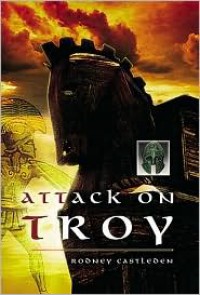
Disclaimer: ARC via Netgalley
The question of whether or not there was a Trojan War has occurred for some time. Was there a Paris, Achilles, Menelaus, or Helen? What about that horse? Was it really a horse? Alexander the Great supposedly stopped at the tomb of Achilles so the hero worship has been going on for quite a bit.
Castleden’s book, a scholarly work, offers historical evidence and context for a real Trojan war, if not quite the version that Homer recorded, though Castleden does address the areas where Homer and truth coincide, such as the place names and helmet types just to name a couple places.
The book is less a discussion of Mycenae and Hittite history and culture as well as conflicts between the two societies. There is the question of the letter to the Hittite king about a certain runaway prince with a woman.
The book is scholarly but not dry. There are discussions about siege strategies, the role of the generals on the battlefield and such. You do not have to be an expert on the ancient world or even ancient Greece for the book to be readable or concise.
It does help to have familiarity with the story of Troy itself, and to be fair, at one point there is a bit too much play by play. But this was an interesting book.
Just checking to see how everyone is doing. Work is giving us two weeks and then we switch to online.
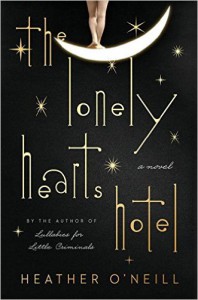
I heard about this book because the author was part of a panel about the arts in Montreal on a BBC Arts and Culture show. The book traces the lives of two orphans in the Montreal of the turn of the century and depression.
O’Neill’s two central characters are Rose and Pierrot, both of who’s birth is less than wanted By rights, both should have died. By tracing their lives, O’Neill looks at how gender can affect the outcome of life. At first, it seems that Pierrot is going to have the easier life but, well things change.
O’Neill’s novel is blunt, very blunt, when it comes to describing sex, and the blunt non-romantic passages contrast with the almost fairy tale quality of the novel. O’Neill transforms Montreal of the 1900s-1930s to an almost magical place with the description. There are some beautiful passages –like the Montreal rat worrying about New York rats.
It is O’Neill’s use of language and humor that carries the book. The magic that Rose and Pierrot install in their audience is what O’Neill does to the reader. The book makes the real world feel fake. It is like reading a slight less gothic Angela Carter book. The language draws the reader into the story and keeps the reader imprisoned. And it isn’t a bad imprisonment.
The book is something like a fairy tale and something like a fable. There is magic but it is the magic of life.
https://smile.amazon.com/gp/product/B01A70V484/ref=ppx_yo_dt_b_d_asin_title_o01?ie=UTF8&psc=1
So there is a book called Songbird at Midnight whose author has been commenting on reviews, including telling a reviewer that she didn't know about italics. The reviewer wasn't me, and I don't believe in giving such authors more free press (also why I'm not adding the book to Booklikes), but just so we are clear:
1. Italics are not used when reporting on the wording of slogan or on someone's shirt.
2. Italics are used for emphasis but too many italics used that way make your characters take weird.
3. Author needs to review basic comma usage. There is not legit reason to have perfume and anti-perspirant in one group.
4.stage manager/sound engineer not "stage manager slash sound engineer"
5. Apparently coffee trays have hands.
6. Can we talk about how often white men overuse the name "Running Bear" because I really think we should?
7. semi-colons and commas are not interchangeable.
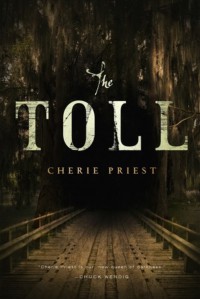
Cherie Priest's Toll does not strictly involve the Three Billy Goats Gruff and a troll but it could.
The novel details a small town in a swamp that has a problem with people going missing. Two old ladies may know the secret, or they may not.
What makes the novel work is the atmosphere which propels the story forward. The story is pretty straight forward, but the book does leave the possibility open for more stories set in the same place. (I want more about the doll house to be honest).
FYI - I speak from a position of privilege for I am a white woman.
So this weekend an author who seems to be prone to melt downs had a melt down because a reader noted that they took off a star in the rating for a book because of the use of homophobic slur. This lead not only to the author's fans, friends and what not trotting out the "it's fiction but must be historically accurate point" as well as authors attacking readers, so it is the standard Indie author mess over on twitter.
Here's the thing.
Slurs hurt. That is why they are, well, slurs. Furthermore, it is true that most readers want a degree of historical accuracy, they are also well aware that it is not going to be 100% accurate. In much historical fiction, the women do not always act like a the women of the times must have, sometimes the thoughts of the men are too modern in terms equality. So this argument while valid on the face, is really that valid.
It is also very true that some books should not be comfortable, that by making the reader uncomfortable such work can affect society. This too has some truth, but it is not a reason to use slurs carte blanche.
So when this whole debate went down and then spiraled into indie authors being assswats, I kept thinking about the play I saw Friday night. My General Tubman is a play set in both modern day Philadelphia, and the Civil War past of America. The cast is majority African-American (only 2 white actors), it was written by a WOC, Lorene Carey. Because of its setting, Carey could have justified the use of the n word over the course of the play. (I will not type at the word, and if you do not know what the word is, well, it rhymes with bigger). She could have made all the arguments about shock, about culture, about the different ways it is used/spelled and whatever.
The word is used only two or three times, in one scene. In this scene, John Brown is preparing for his attack on Harper's Ferry and his neighbor, a white woman, comes to warn him about "those armed n*gg*rs" she saw on his property late at night. That scene occurs in the second half of the play. And when that word is used, it carries weight. We also get Brown's reaction to the word. When the word is said, you can feel the subtle shift in the audience (which was mixed) to a belief feeling of uncomfortableness, and using it there made it clear (1) the position of the woman (2) what Tubman and Brown are fighting against (3) the power of the slur. The word comes out hard because it is the first (and only) time in the play that anyone has referred to anyone, especially Tubman, but anyone that way. If you are going to use a slur in writing, this is what you should use it to do, DO NOT drop it round like seasoning because of accuracy. That lessens the context and hurt of the word.
I think also of a book I reread this weekend, Dime Store Magic by Kelley Armstrong, and there is an attempted rape scene (the woman kicks the guy's ass) and no doubt Armstrong could have justified using the word cunt in that scene. The thing is, she was able to write the scene without it and still convey the threat and misogyny of the man who would have been a rapist.
If you are going to use a slur when writing, you should know the power of the word, and reserve that power of that word for when it will have impact, not because using it makes you edgy.
So if you can get to Philly before March 15, I highly recommend seeing My General Tubman at the Arden. It is a play by Lorene Carey. It presents a history of Tubman juxtaposed with a the current rate of black men being imprisoned. It is a wonderful history and timely play.
The acting is great. The only weak part is that there is a love story that does and doesn't work, if you know what I mean.
Carey make excellent use of the idea of the Chorus, who is played by Aaron Bell. Peter DeLaurier is an excellent John Brown, and Danielle Lenee makes an excellent Harriet. She equals Anisha Hinds' portrayal of Tubman in Underground (esp that one woman play episode).
The run has been extended, so if you can, see it.
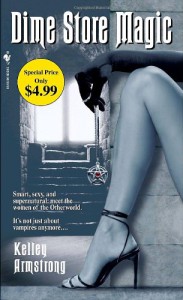
Look, this isn't a perfect book. Let's be honest, but the one thing that Armstrong did in this series (and sadly it still stands out today) is she actually has the women interact with each other. The bad guys are men and women, and the good guys are men and women. The evil women work together and the good women work together. The women are not in competition with each other and are actually friends. Even today, this is somewhat rare in UF and it is so refreshing to see this.
Additionally, in this book Armstrong shows how being a good person who has had a stable life does not necessary equal boring. I like that.
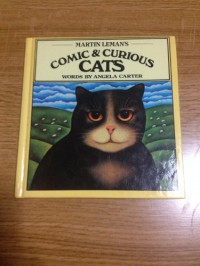
Angela Carter fan girl that I am, I didn't know about this book until it popped up on my Thriftbooks recs.
Carter provided the words for this children's alphabet book about cats. Some letters are combined on one pages, but Carter makes excellent use of alliteration. The illustrations are nice, and there are some wonderful lines.
I thought this would be a good way for us to comment and then share the post to see who is still here to make sure we are all following each other. I only bring this up because I see some people posting and I appear to be the only one following their reviews.
I have gotten some comments from bots though which is another reason why I wanted us all to take this Friday to comment and share this post so we can all find each other.
Feel free to drop your name in the comments and share!

I am not a fan of Gwyneth Paltrow’s. I think Goop is nothing but snake oil. I never thought she could act. But when she came out about her the harassment she received from Harvey Weinstein, I never questioned it, though I know some people who claim to be Paltrow fans did. And that is the point isn’t it.
Kantor and Twohey relate the investigation into Harvey Weinstein as well as how that investigation is connected to ones about Trump and Kavanagh. In part the book chronicles the changes and impact of the investigation but also a defensive of how journalism works and the work that reporters do.
It is an angry inducing book, not simply because of the subject matter, but of the reaction by the media and various famous people to the accusations and reporting. It isn’t just the reaction of Weinstein and his team, but also other people in both feminist and reporting schools.
What is most frustrating and angry inducing is the lack of support that some women refuse to give or how they cover for the famous man. I am not talking about Paltrow or other actresses not coming forward sooner. No, that is different and harder. I’m talking about the lawyers who wear their feminist credentials as a big bright flag, yet fight for Weinstein. It is heartening to read about the women who did stand together and stood up for each other, but also then let down either by the system or by the law, the nature of some of the agreements is just disgusting.
If you have read Ronan Farrow’s book, then you should also read this one. If you have read this, read Farrow’s. The two books do complement each other quite well.

I am very annoyed that I will not get to see the exhibit on Troy that is currently at the British Museum. Words cannot express how upset I am by this. I am beyond pissed. You must understand, I cannot remember a time when the story of Troy has not fascinated me. Michael Woods’ series, In Search of the Trojan War, was the first adult thing I was allowed to watch.
So it was really only a question of when I would read this book.
The title of the book plays on the silence that is exhibited by the women who find themselves at the heart of the action of the Iliad – Brises and Chrysies. The two women who, in essence, Agamemnon and Achilles got to war over. The two women are given very little in the Iliad, and Barker attempts to correct this.
In part it works, in part it doesn’t. For a book that is supposed to the voice of women, there are too many sections where the action is solely on Achilles and Partoculus. The book starts in Brises’ pov but switches at points to a third person pov with the focus on Achilles and Partoculus, or some other man. This makes for strange reading because it takes over the voice of the women. Brises herself seems aware of this as the ending paragraph indicate, but it is still very strange.
The point of shift, a change in perspective to an established should bring some fresh perspective, despite being constrained in various ways by the original story. While Barker focus on the toll of are on those who are not in battle, there really isn’t much new here. There are flashes of what could have been a different novel – the bits about Achilles and Thetis are wonderful and powerful. But there isn’t much new, and at some points, it is hard not to feel that a work such as Bailey’s Cassandra, Princess of Troy, isn’t a better novel.
It’s not a bad book, but it is a book you want more from.